
Can anger be a healthy response to unjust situations like the abuse that has occurred in Rigpa and Shambhala? Or should it be avoided at all costs? Let’s look at the Dalai Lama’s view on compassionate anger.
In the West, we see emotions as either pleasurable or painful and relate to them accordingly. But from a Buddhist perspective, mental states that involve an emotional dimension are seen, instead, as either beneficial or harmful.
The Dalai Lama explains that all emotions have an evolutionary purpose and a biological dimension – in other words, they’re natural responses to circumstances that appear in our lives. For example, he says “…anger helps us repel forces that are detrimental to our survival and well-being.”
It’s natural for feelings, including anger, to arise. Emotions aren’t harmful in and of themselves. All emotions have destructive and non-destructive sides.
“So the important point to bear in mind is that these feelings are not destructive in themselves; they become destructive only when their intensity is out of promotion to the situation, or when they arise in situations that do not call for them.”
He further clarifies::
“Generally, we can define destructive emotions as those states which undermine our well-being by creating inner turmoil, thereby undermining self-control and depriving us of mental freedom. Within this, it is also possible to distinguish between two sub-categories: those emotional states that are destructive in themselves, such as greed, hatred, or malice; and those states, such as attachment, anger, or fear, which only become destructive when their intensity is disproportionate to the situation in which they arise.”
Does that seem obvious?
It might be for some individuals. But you may have been raised to believe that anger is always bad and you should never feel it. If you do, you’re bad too.
Or you may have spent years in a spiritual or religious organization where you were taught that anger—even a single moment of anger—should always be avoided or you’ll go directly to hell. There are hell realms in Buddhism too.
Or you may have come to believe that compassion means patience, tolerance, and forgiveness and doesn’t include anger at all. You should be meek and submissive.
Or you may have been told that if you’re angry, you’re not in the natural of mind. Very bad.
But is this true? The Dalai Lama suggests there’s far more subtlety involved when it comes to emotions, including anger. He says:
“So when we are dealing with matters as subtle as human mental processes, it is important not to be too dogmatic. It is difficult or impossible to determine whether or not a given mental state is destructive without knowing the context. Often we can make this determination only by taking into account the underlying motivation, the specific object of the emotion, the consequences of the emotion, and so on. In the area of the human mind, therefore, we should always maintain an attitude of open-mindedness, pragmatism, and flexibility.”
If you find yourself becoming judgmental and righteous in response to anger that arises in yourself or others, you might want to take a step back and be sure you understand the context.
For example, some people dismissed the 8 letter writers who revealed emotional, physical, and sexual abuse in Rigpa because they “sounded so angry.” Or because the letter they wrote was so strong.
But the Dalai says anger and strong countermeasures can be an appropriate response to wrongdoing. He even says we should continue to harbor a feeling of anger until the injustice is corrected. Let’s look at what he says exactly.
Dalai Lama Quotes on Compassionate Anger
The Dalai Lama says anger can be constructive at times.
“Similarly, even anger is not always destructive. For example, in some situations strong compassion may give rise to an equally strong sense of outrage—that is anger about an injustice. Again, feeling angry can, in the short term, make our minds more focused and give us an extra burst of energy and determination. In these ways, anger can, in certain situations, make us more effective in getting things done and in obtaining what we rightly seek. However, when anger extends beyond this practical function, most of the energy it brings us is not helpful at all. Since all of us have probably at one time or another, been on the receiving end of other people’s anger, we all have experience of its unpleasant consequences.”
In the following quotes, the Dalai Lama sheds light on “compassionate anger.” You might be surprised to hear he encourages it by saying it is a good anger that is worth having.
“When faced with economic or any other kind of injustice, it is totally wrong for a religious person to remain indifferent. Religious people must struggle to solve these problems.”
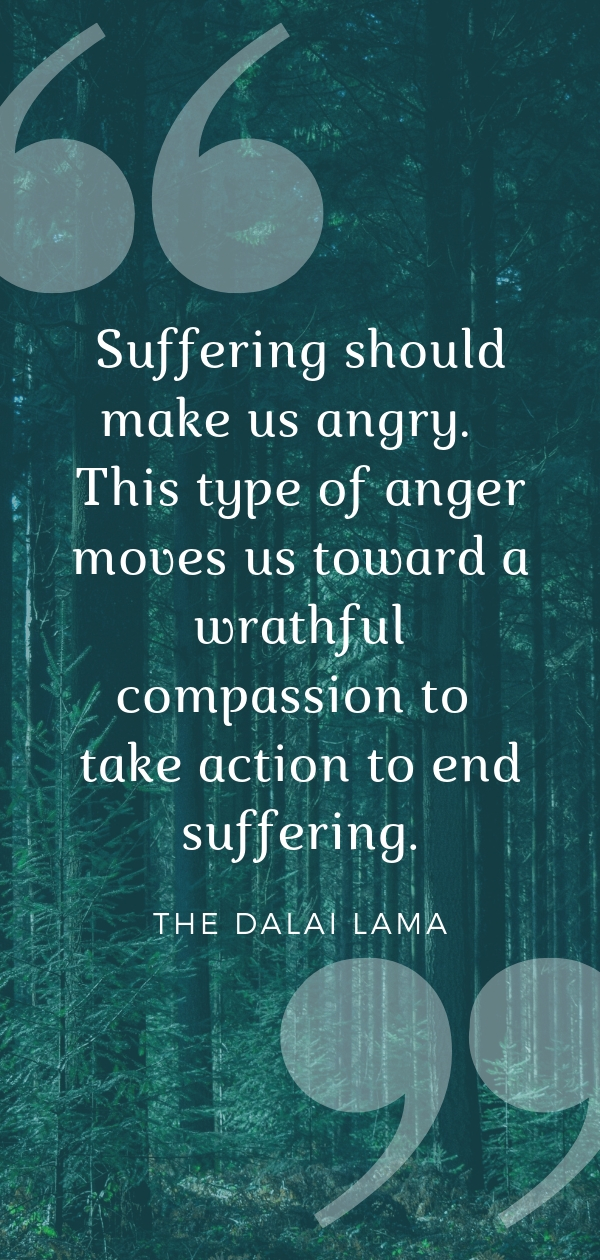
“Suffering should make us angry. This type of anger moves us toward a wrathful compassion to take action to end suffering.”
“Here the issue is how to deal with anger. There are two types of anger. One type arises out of compassion; that kind of anger is useful. Anger that is motivated by compassion or a desire to correct social injustice, and does not seek to harm the other person, is a good anger that is worth having.”
“Anger brings more energy, more determination, more forceful action to correct injustice.”
“The deep motivation is compassion, but it takes anger as the means to accomplish its end.”
“To use anger as a motivating force, should we transform it into another state, into something positive? Or should we maintain it as it is?
The answer to this question is a person’s state of mind—that is, the motivation that causes the action. When we act, that act arises out of a cause that already exists in us.
“If we act when our inner motivation is hatred toward another person, then that hatred expressed as anger will lead to destructive action. This is negative action. But if we act out of consideration for the other person, if we are motivated by affection and sympathy, the we can act out of anger because we are concerned for that person’s well-being.”
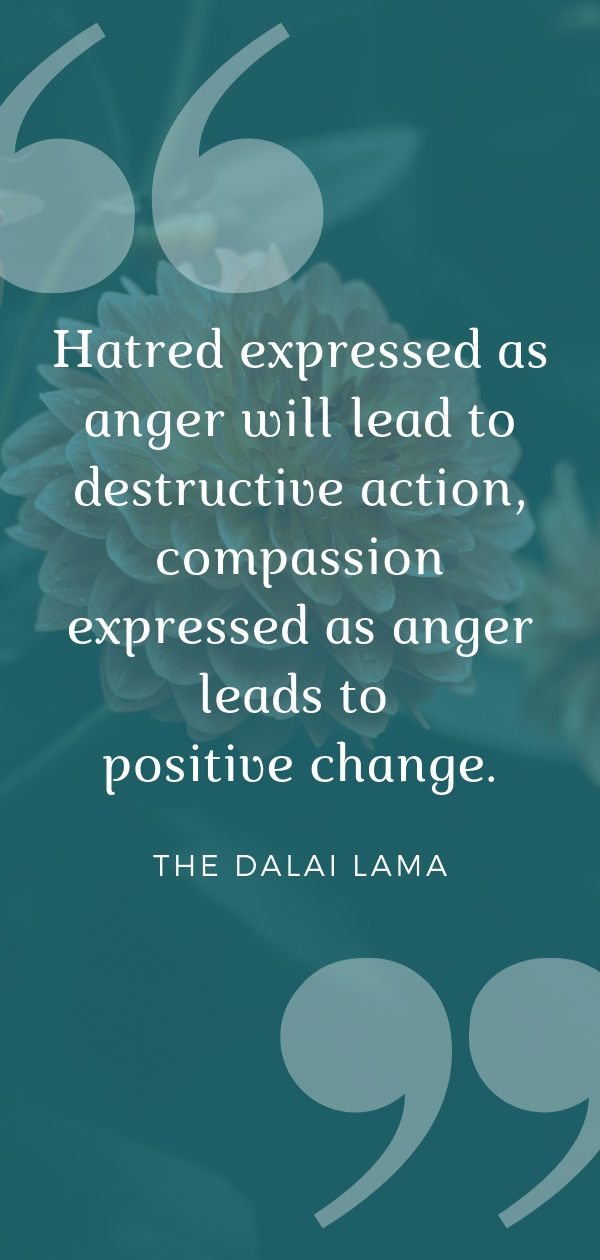
“Hatred expressed as anger will lead to destructive action, compassion expressed as anger leads to positive change.”
“Anger toward social injustice will remain until the goal is achieved. It has to remain.
In this case, one should truly continue to harbor a feeling of anger. That anger is directed toward the social injustice itself, along with the struggle to correct it, so the anger should be maintained until the goal is achieved. It is necessary in order to stop social injustice and wrong destructive actions.
For example, a negative or harsh attitude toward Chinese wrongdoing, such as human rights violations and torture, will remain so long as those actions continue. One will be angry as long as injustice remains.”
“In theory, it is true that anger is never good, and we must get rid of all attachment. But when we actually confront social injustice and think about how to correct it, not all anger is bad, and we shouldn’t try to overcome all attachment. Anger is bad in theory, and we must get ride of attachment, but in practice, we cannot completely negate them all. We must discern between theory and practice.”
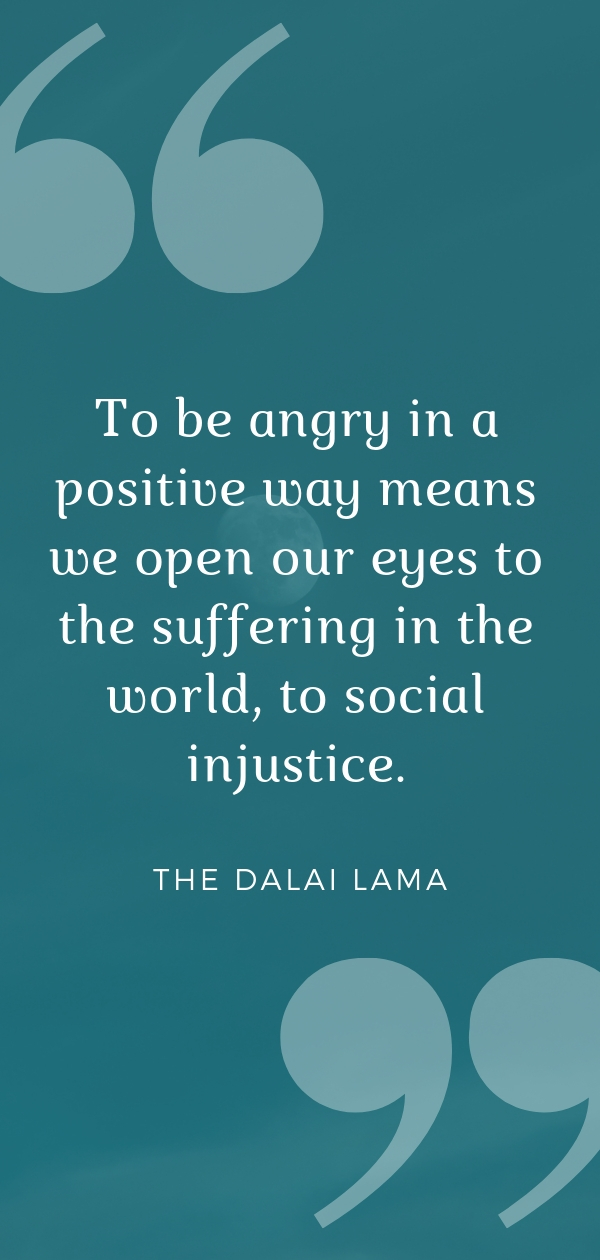
“To be angry is a very subjective thing. To be angry in a positive way means we open our eyes to the suffering in the world, to social injustice.”
“It is not enough to remain quietly meditating in the monastery—we must confront the violence in the outside world.”
“To be angry on behalf of those who are treated unjustly means that we have compassionate anger. This type of anger leads to right action, and leads to social change.
To be angry toward the people in power does not create change. It creates more anger, more resentment, more fighting.”
“However, if one is treated unfairly and if the situation is left unaddressed, it may have extremely negative consequences for the perpetrator of the crime. Such a situation calls for a strong counteraction. Under such circumstances, it is possible that one can, out of compassion for the perpetrator of the crime—and without generating anger and hatred—actually take a strong stand and strong countermeasures. In fact, one of the precepts of the bodhisattva vows is to take strong countermeasures when the situation calls for it. If a bodhisattva doesn’t take strong countermeasures when the situation requires, then that constitutes an infraction of one of the vows.” –
Can Anger and Compassion Coexist?
But doesn’t compassion mean you should be meek, submissive, and always forgive?
Quite to the contrary, the Dalai Lama says that compassion sometimes requires a strong countermeasure. In fact, if you do not respond appropriately and intercede when mistreatment occurs, you could be partially responsible for future harm that takes place.
Let’s look at what the Dalai Lama says about the true meaning of compassion.
“Nothing in the principle of compassion—the wish to see others relieved of suffering—involves surrender to the misdeeds of others. Nor does compassion demand that we meekly accept injustice. Far from promoting weakness or passivity, compassion requires great fortitude and strength of character.”
“…compassion by no means implies surrender in the face of wrongdoing or injustice. When an unjust situation demands a strong response, as in the case of apartheid, compassion demands, not that we accept injustice, but that we take a stand against it. It does imply that such a stand should be non-violent.”
“Imagine yourself with difficult neighbors who repeatedly behave aggressively toward you. What is the appropriate compassionate response? In my understanding, there is no reason why compassion, including of course compassion toward the aggressors, should prevent you from making a forceful response. Depending on the context, a failure to respond with strong measures, thereby allowing the aggressors to continue their destructive behavior, could even make you partially responsible for the harm they continue to inflict. In addition, doing nothing to oppose such behavior in effect encourages those unfortunate persons, with the likely consequence that they will move on to even more destructive behavior, bringing still greater harm to others and, in the long run, to themselves. The only way to change a person’s mind is with concern, not with anger or hatred. Physical or violent measures can only restrain other’s physical behavior, never their mind.”
What About Hatred?
“The important point about the principle of compassion, as a basis for the exercise of justice, is that it is directed not toward actions, but toward the actor. Compassion demands that we condemn wrong actions and oppose them with all means necessary, while at the same time forgiving and maintain an attitude of kindness toward the perpetrators of those actions.”
“As I have already mentioned, it is vital to keep in mind the distinction between the doer and the deed. Sometimes this can be hard. When we ourselves or those very close to us have been victims of terrible crimes, it can be difficult not to feel hatred toward the perpetrators of those crimes.”
The Dalai Lama says anger should be directed toward the action or the injustice not toward the individual or it can have detrimental consequences for both you and the other person or persons.
But, understandably, when the actions are heinous, as in the case of abuse and violence, this can be hard. What do you do? The Dalai Lama shares a precise methodology for working with afflictive emotions like anger in the chapter, “Dealing with Afflictive Emotions” in Beyond Religion, Ethics for a Whole World.
This is my feeling about it. If hatred arises within you against the perpetrator(s), don’t be harsh or judgmental towards yourself because religious doctrine says hatred is wrong. In fact, you may go through a stage when you feel hatred. It could last for some time.
If that’s the case, try to be compassionate towards yourself. You’ve endured too much, and you’re only human. But try not to act out hatred in harmful ways.
Don’t suppress your emotions, which might aggravate and intensify them until they finally boil over and result in harmful words or actions. But also try not to feed destructive emotions like hatred, or it will grow stronger and keep you in a constant state of distress. Work with your own mind and heart to heal and reduce feelings of hatred over time. When you feel ready, use your anger for constructive purposes as the Dalai Lama suggests.
Anger Is Not Automatically Good or Bad
According to the Dalai Lama, anger is not automatically good or bad. It can be constructive or destructive. It depends on the state of your mind and your motivation. And chances are, being human, your motivation may be mixed at times. Be aware of that and do the best you can, whatever the situation. Never hesitate to express your anger constructively in the face of injustice and wrongdoing.
But don’t accept what the Dalai Lama has said about compassionate anger on faith or admiration alone. As he always says, investigate it for yourself. Think about it and determine whether it’s true and valid yourself.
I feel angry about the abuse that has occurred in Rigpa, Shambhala, and other Buddhist organizations. But I don’t feel stuck in anger, and I don’t feel hatred toward anyone in Rigpa. I try to use my anger constructively, as the Dalai Lama suggests, to write on this blog, education others especially about trauma, and warn them about the potential dangers.
I believe the 8 letter writers were motivated by compassionate anger as well.
This article first appeared on Always Well Within, and was modified for the How Did It Happen Blog.
Sources and Resources
- Be Angry, The Dalai Lama – An interview conducted by Noriyuki Oda, a well known Japanese author, lecturer, and cultural anthropologist.
- Beyond Religion, Ethics for the Whole World, The Dalai Lama
- Don’t Let Hatred Destroy Your Practice, Spring 2019 Edition of Buddhadharma Magazine
Comments are now turned off on the blog because we are no longer able to respond to them or deal with the high volume of spam on the blog. However, we encourage discussion of this or other posts with your friends, in your Buddhist communities and in your Facebook Groups. Thanks for understanding, Sandra
[jetpack_subscription_form]

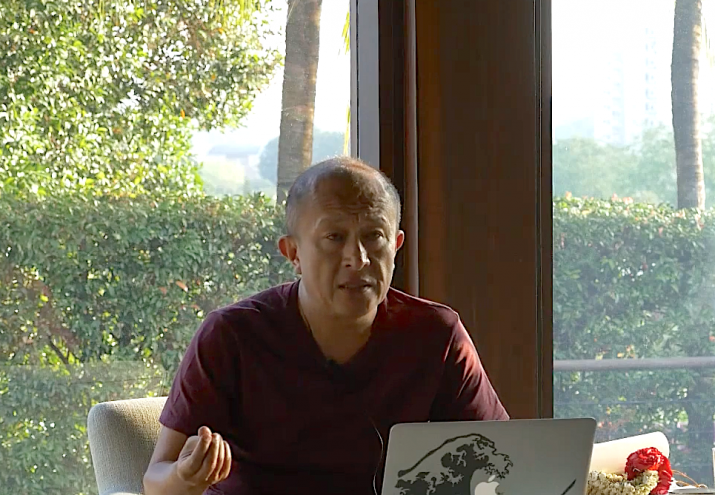
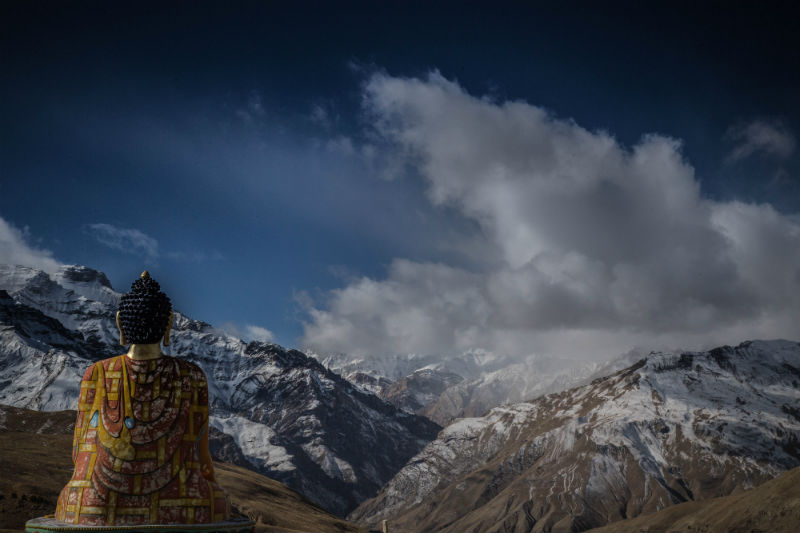 A crisis, like the allegations of abuse in Rigpa, can unleash a torrent of afflictive emotions: blame, judgment, anger, despair, fear — to name just a few. People take sides and attack the other side. People get stuck in their positions and lose the ability to hear one another.
A crisis, like the allegations of abuse in Rigpa, can unleash a torrent of afflictive emotions: blame, judgment, anger, despair, fear — to name just a few. People take sides and attack the other side. People get stuck in their positions and lose the ability to hear one another.